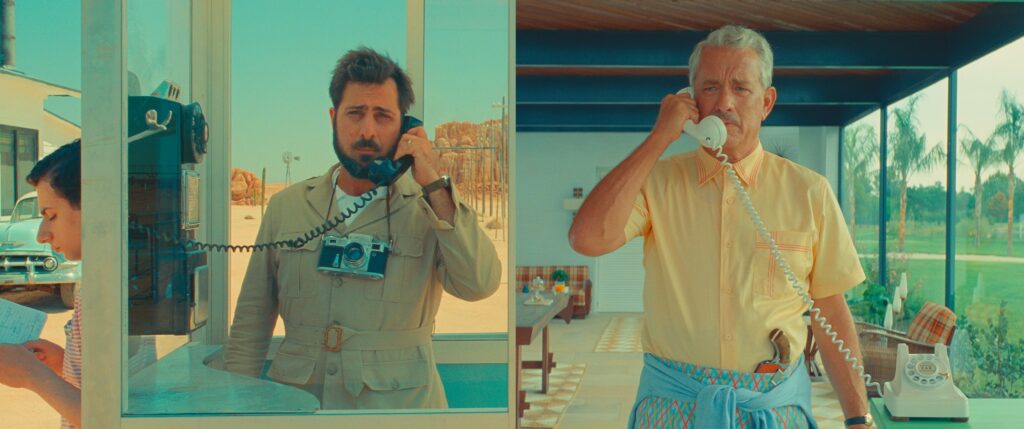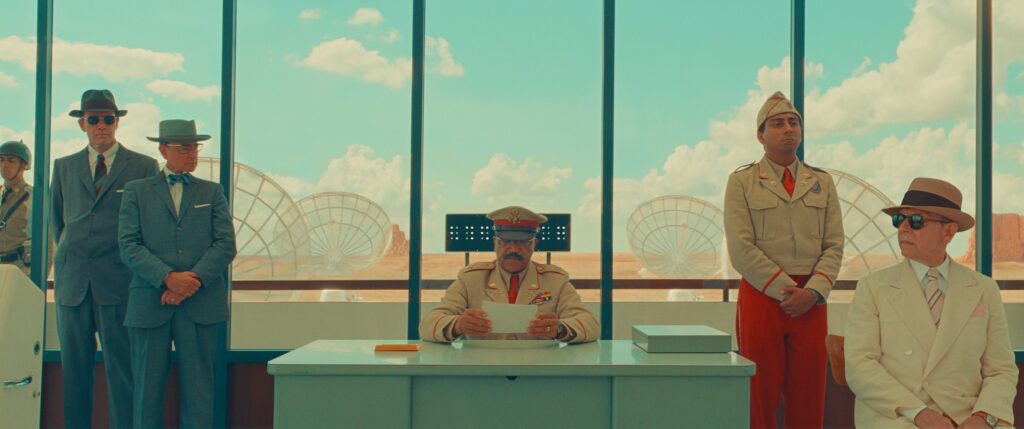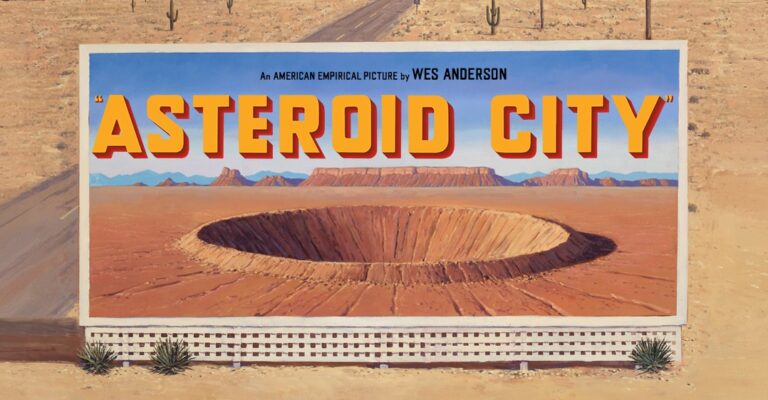The Lamplight Review recently took part in a virtual press conference with Oscar-Winning director Wes Anderson and the cast of his new film Asteroid City. Told through multiple frames of reality, the film takes place in 1955 and deals with a Broadway style play about families gathering for a Junior Stargazer/Space Cadet convention in a fictional, highly stylized desert town. Intimate portrayals of grief and the bond that can grow between strangers drive the narrative amidst world-changing events. For our full review, click here.
But to prepare our audience for the film’s release, below are the 5 things we deemed the most interesting about the process of making Asteroid City, direct from the mouths of those who made it:
The concept of the film started with the notion of writing a movie specifically for Jason Schwartzman as the lead:
Wes Anderson: You know, oddly, that’s not a question I’ve been asked specifically. I would say that the quick answer would be usually, for me, starting a movie, starting to write a script, is usually not an idea for it. It’s a couple of ideas. Two or three things. And I would say this one the three ideas were, one, Roman Coppola and I created this thing together. We wanted to write a part for Jason Schwartzman at the center of a movie that would be something he hadn’t done before. So that was number one. That’s the beginning. And we didn’t really know what it was, but we sort of had a few notions about what this character was going through.
The second thing was we were interested in the setting of 1950s kind of New York theater. One or other golden age of Broadway-ish thing. In this case, sort of the Actor’s Studio variety of it. And the other thing was, we thought we’d tell a story of the play they’re putting on. And the original thing was it was a play called Automat, and was gonna all be in this automat. And then we sort of decided, you know, Automat, it’s too…it’s too small. So we expanded it just to the desert. And I guess it then became something like this interaction of a black and white New York stage and a color cinema scope-ish western cinema kind of story.

Wes Anderson did an animatic of the entire movie before filming with actors and Tom Hanks did an unauthorized screening of said animatic:
Tom Hanks: And so, we were there, and part of it was like, “That’s Wes Anderson?” I would imagine, you know, the spectacle, the, you know, pompous or smoking a pipe, kind of like what you did. And we just talked about — we didn’t talk about anything at all. But I don’t know if I said at that point, “Hey, come on, man, come on. I mean, let me into that rep company of yours. Give me a call.”
And this came about literally because of a lovely email that said — we had met since then a couple of times. And said, “Would you like to come and join us?” And I said, “Yeah. Sure.” What is odd is he sends you a version of the movie that doesn’t really need you. The animatic of the film that he put together, which I thought was your voice, part of it, ’cause I know you collaborate so much, but it was all just Wes. So you see a complete animatic version of the movie, which I saw, and I called you up and said, “Well, I’m in, but I don’t see how you need anybody to do this now.” Because just the animatic has got…
Wes Anderson: Well, I remember you screened it on a big screen.
Tom Hanks: Oh, yes.
Wes Anderson: I was like, “I don’t know if it was meant for that.” You know?
Tom Hanks: It looked like Beauty and the Beast to us. And all this stuff that you hear about turned out to be true. And I haven’t seen a Wes Anderson movie that I didn’t wish that I was in. So it was great to be a part of this. And the role was great. I think you used the reference of, “We’re looking for a retired Ronald Reagan type.” And I go, “I’m your man.”
Bryan Cranston didn’t understand the Asteroid City script at first:
Bryan Cranston: Yeah. What does it mean? [laugh] It’s so specific and so dense with detail that it is sometimes, I have to read it a couple times to really get a sense of what we’re doing. This is a movie about a television show that’s doing an expose on a theater piece.
That in itself is kind of a Russian doll sort of thing. And then there’s the actors who are also playing. So when you read that in script form, it can be a little daunting. So it was illuminating to see the cartoon [Wes’ animatic], and extremely helpful.

Jeffrey Wright nailed his first on camera monologue in one take:
Wes Anderson: Well, can I mention one thing about the process? Can I describe how that happened in two phases?
Jeffrey Wright: Oof.
Wes Anderson: Is that all right to say? Because Jeffrey arrived like, kind of, late night, and the next day he’s shooting. And the next day’s he’s shooting, you know, rather long paragraphs in one take, with a lot of blocking. And we did allow and it was good, but it was sort of like, the part was written for him, and it wasn’t quite the part, the thing I’ve seen him do on stage, you know. I’ve known how he can do that. And we kind of hedged a bit with some other shots. And then…
Jeffrey Wright: It was a rehearsal.
Wes Anderson: It was a rehearsal. The next day, I was like, it was good. Or maybe it was day two, I was like, “Do you want to do it again?” He said, “I would love to.” And we went back on the next day, day and a half later, on Saturday morning, set it all up exactly the same. One take, and that’s what’s in the movie. He just did it. And it was really, like, everybody applauded. It was good. Everybody was there. Anyway, I was like, “Well that was the very good directing.” Let’s go back. Let’s do it again.
Jeffrey Wright: One take, two days. Yeah.
The three young actresses weren’t enough to stop Wes Anderson from making the cast of Asteroid City do the excessive number of takes he requires:
Tom Hanks: Look, there’s a very convivial atmosphere that we are all very much attracted to. But that is the secondary experience. The work that we do on the set is incredibly focused and there’s nobody who works harder at this than Wes. And no one, because Wes doesn’t, walks away saying, no, that’s good enough. I think that’s good enough. Let’s talk about those three little girls that were like wrangling bats [laughter] for Wes.
That devoured the first, you know, 47 days of shooting, so that by the time we got there, some of us were thinking, “Well, he’s exhausted by those kids. So we’ll be able to skate through it”. But no. No. No. It is incredibly focused and concentrated and we, look, it is 60 takes in order to get down to — I was working with, we had the big scene with Jason [Schwartzman]. He said, “Do you like to do a lot of takes?” ‘Cause we’re on like take 17. And I said, “Yeah, I do, ‘cause we get to start at the beginning and go all the way through. And we get to work on the whole thing.” And I know a lot of guys saying, “Take three is the truth I’m looking for,” and then we move on. It’s not the case with Wes.
Scarlett Johansson: I remember we were doing that scene at the picnic table and it was so particular and so specific and those girls were on his side. And they would just go, “Wes, I need more ketchup.” And you’re like, more ketchup. And you were just wrapped around. [laugh]
Wes Anderson: And Scarlett was like, “Is this what’s been going on the past three months? You’re gonna go back in there and say more chili?” Okay. All right.
Asteroid City hits theaters everywhere June 23.

